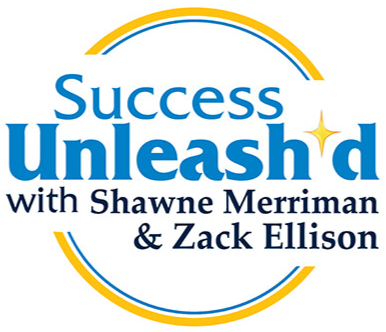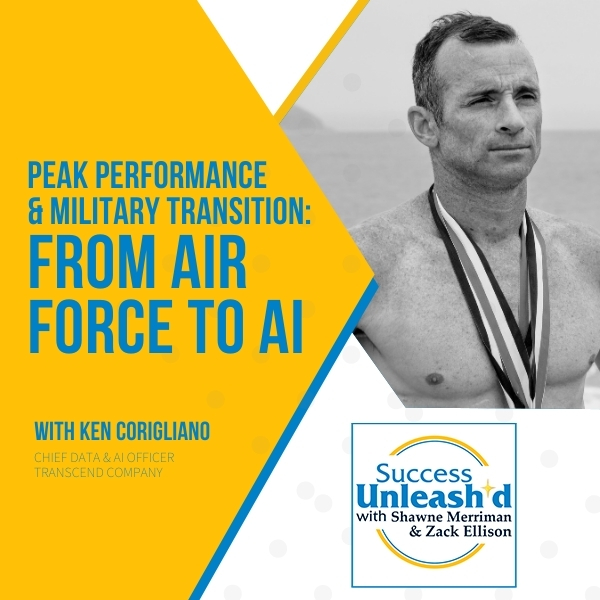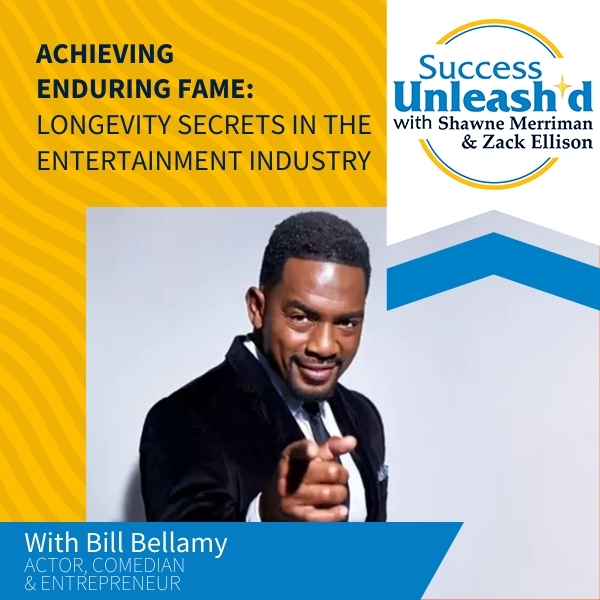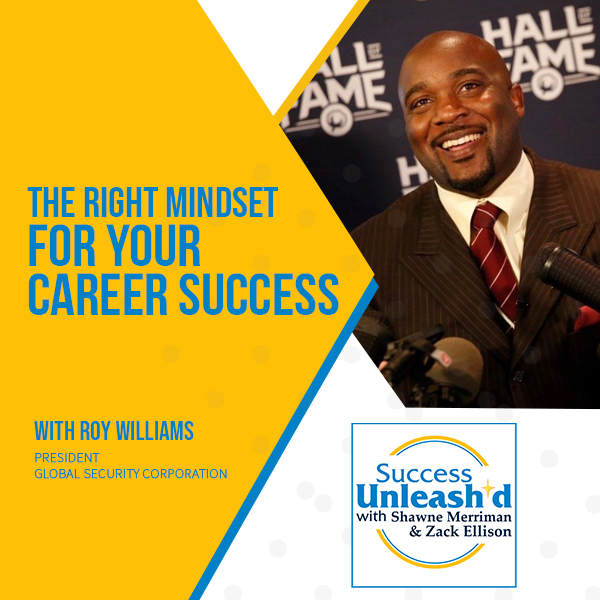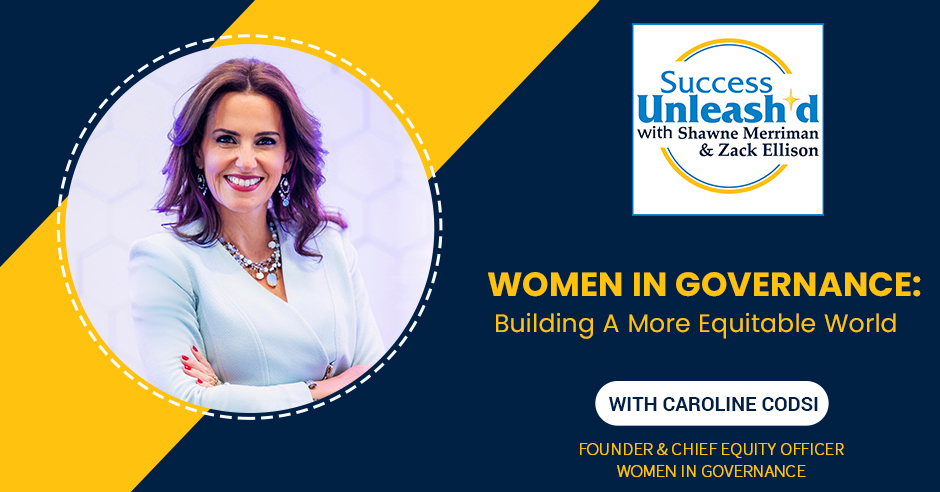
Ready to unlock the secrets to shattering glass ceilings and championing equity? Join Zack Ellison and Shawne Merriman in this episode of Success Unleash’d as they connect with Caroline Codsi of Women in Governance. Discover her inspiring journey from corporate frustration to leading a nationwide movement for gender parity. Learn about the groundbreaking parity certification impacting major companies, the surprising structural barriers hindering women, and the power of audacity and resilience. Plus, Caroline shares a thought-provoking concern about the future of gender dynamics. Tune in for an empowering conversation that will challenge your perspective and ignite your drive for change!
Success Unleash’d Principles From This Episode
1. Start with Purpose, Then Build the Platform
Caroline turned her personal experience with inequity into a mission. Identify a problem you’re passionate about solving and create a platform that drives change.
2. Fix the System, Not the Individual
Rather than “fixing” women to fit into broken systems, Caroline emphasized transforming workplace cultures. Focus on reshaping environments to unlock potential for everyone.
3. Measure What Matters
Caroline’s certification initiative with McKinsey highlighted that if you don’t measure equity gaps, you can’t close them. Use data-driven tools to identify disparities and guide strategy.
4. Don’t Wait to Be Ready—Take the Leap
Transitioning from executive to entrepreneur, Caroline left a secure, high-paying job to pursue her passion full time. Success often requires courage over certainty.
5. Recognize and Challenge Unconscious Bias
From salary negotiations to promotion practices, unconscious biases persist. Raise awareness and challenge long-standing norms to create truly equitable opportunities.
6. Volunteers Can Power Big Movements
Before securing full-time staff, Caroline mobilized over 100 executive volunteers. Harness collective passion to build momentum—even without big budgets.
7. Certify, Standardize, and Scale Equity
By developing a certification model similar to ISO, Caroline created a replicable way for organizations to address gender equity. Create frameworks that scale impact beyond individual coaching.
8. Understand Your Value—and Advocate for It
Women often hesitate to negotiate or ask for what they deserve. Know your worth and ensure your compensation and responsibilities are aligned.
9. Start Small, Think Big
What began as a side project became a national organization. Start where you are, but design your efforts with future impact in mind.
10. Be All In or Miss the Magic
Caroline’s leap of faith to run Women in Governance full-time catalyzed its exponential growth. True transformation often happens only when you fully commit.
—
Watch the Episode Here
Listen to the Podcast Here
Women In Governance: Building A More Equitable World With Caroline Codsi
We have with us Caroline Codsi who is the Founder and Chief Equity Officer at Women in Governance. Caroline’s based in Montreal, the Great North. We appreciate you coming on, Caroline.
Thank you so much for having me.
You’re doing some really interesting things. You’re well followed. You’ve got tons of followers, incredible connections to some of the top decision makers on the planet. Talk about what you’re doing now and how you got here for people that don’t know.
The Founding Of Women In Governance
Thanks, Zack. I’ve founded Women in Governance in 2010. The idea of building women in governance came from my own experience. My last job, I was executive vice president of one of Canada’s largest medical expertise firms, and I was reporting to an all-male, pale, stale board with very few innovative ideas and not really realizing how the importance of diversity and more women in decision making bodies was central, was crucial for any business to thrive. I founded Women in Governance as a side project. It was my passion project. It turned into my job, into my company. We’ve got about twelve full-time staff and we’ve been growing exponentially over the past few years.
Talk about what the company does and what its mission is and how it’s executing on that.
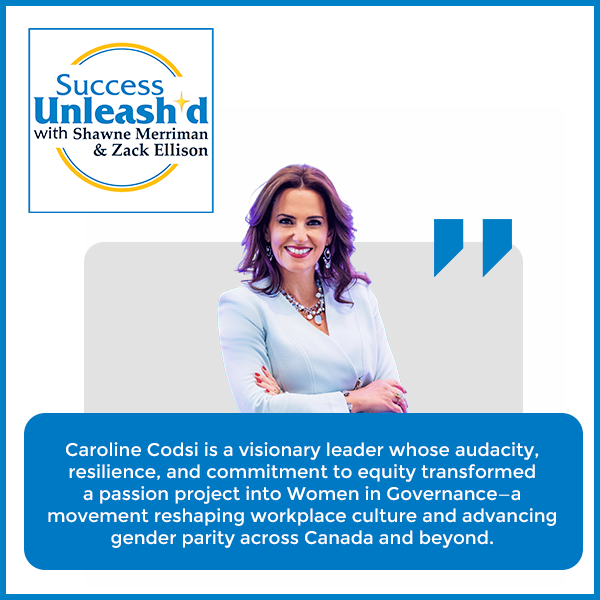
When we first started in 2010, the idea was to support the women who wanted to access board seats, decision making bodies, etc. We first had mentoring programs, governance training programs, major events, panels, fireside chats, etc. We realized that the women would go back into workplaces that were traditionally built by men for men and would still have trouble progressing.
The issue, rather than focusing on fixing the women, was fixing the workplace, fixing the workplace culture, fixing the systemic barriers that women were facing. We at the time went to see mckinsey and Company to say, “We’ve got this idea of a certification, like an ISO, if you will, that organizations would need to put themselves through to better understand where they stand on the gender parity spectrum and what they need to do to progress.”
If you don’t measure a gap, then how can you actually effectively address it? How can you close it or narrow it? You’ve got to better understand where the gaps are, what their magnitude is, what their root causes are. We worked with mckinsey and Company for four years. We’ve built this certification. We’ve got about 150 major corporations from all industries that have been enrolled in this and have successfully moved the needle on the gender parity spectrum.
I wanted to ask something because I always encourage a lot of people, like whatever your main job is, whatever you’re doing, to do something, you actually have a real passion. When did that passion turn into, “This is what I want to do.” At first, you were like, “I’m doing it because maybe it’s a side thing, or it’s a good idea. I think it’s a good cause.” You had a passion for it, but when did you really venture down to that this is what we want to do, this is a mission?
That’s exactly how it started. It started like a calling. I can see there’s a problem in our society. I can tell that there are women who lack the self-confidence, lack maybe the ability to come out of their comfort zone. There’s work to do with the women. Fine. We’ve done that work. We realize, “That’s not enough. We’ve got to go further.” My passion was to say I can see the problem and I want to do something to fix it.
When we launched the parity certification, that was in 2017, then I had a decision to make. Do I continue to do this as my side project, as a volunteer? I had about 100 people around me, all volunteers, all executives from major co corporations who were doing the work alongside. Was that what we wanted or did I actually need to take a leap of faith and dive in and actually do this as my career?
It was a big decision to make, quite honestly, because I was making a lot of money in my previous life. To decide that I was going to leave a very comfortable, very senior executive role with all the perks that come with it to be an entrepreneur and see whether I was going to be able even to pay myself a salary, let alone hire people to support me. When you’re used to having an assistant, a VP of HR, a VP of marketing, a VP of finance, and everything around you. All of a sudden, you are all of that yourself. You are the receptionist, you’re the accounts payable, the accounts receivable, you’re the salesperson. That was quite the leap of faith. I really felt I had to do it if I wanted to bring this to the next level. Just doing this on the side was just not going to cut it.
Caroline, when you worked with mckinsey on identifying a lot of the structural barriers, what were the key findings there? This will be a two-part question. The next part will be how do you navigate those? Start out with just educating us on what the big structural barriers are, and then we can figure out how to, to navigate around those.
Structural Barriers To Gender Equity
I’ll tell you something very basic, Zack, nothing changes if nothing changes. Corporations have been doing the same thing for the past decades and expecting, all of a sudden, a different outcome. There is a barrier at the entry level. Already, women who are, let’s say, MBA graduates, young women, are already not getting offered the same salary level as their male counterparts, but they don’t have less experience. They may be less bold, they ask for less, they negotiate less, and they don’t realize what they’re leaving on the table. These are things that many companies will think, “It’s fine. We’re getting a better bang for our buck.” When comes the time to promote, they promote a man, they’ll give him the salary that goes with it. They don’t always do that with the woman because the man is not going to let it slide.
Nothing changes if nothing changes. Share on XHe’s going to say, “I’m moving from director to vice president. You’re giving me this extra work to do and responsibilities, and where’s my piece of the pie that goes with it?” Women often got that Imposter Syndrome where they think, “They’re giving me this promotion. It’s huge and that’s enough. I’m not going to ask for the salary that goes with it.”
There’s a lot of unconscious bias that HR departments, that recruiting managers have been perpetrating for many years. Also, asking someone, when you’re recruiting someone and saying, “How much are you making now?” If it’s a woman and she’s already coming from a structure where there was discrimination, where she was underpaid, where there was a gender wage gap, you are actually just bringing this into your workplace. How about just dropping that question to make it more equitable? That’s what we’re looking for, for equity in terms of the chances from the get-go.
I love that point you made about the question about past salary. It’s funny, years ago, I won’t say which firm I was at, but I was looking to leave for something bigger. Quite frankly, I was underpaid in the role that I was in. I felt like I should be paid a lot more and in a much more senior position. I had a lot of firms that were recruiting me and basically, a lot of people took my call because I had worked at really good firms and always performed really well. They’d start with, “What are you making now?” They would base the comp package that they were going to offer me on what I was making now.
I said, “That’s not fair in a sense because what I’m making now is low, which is why reason why I’m leaving. I’m not leaving to be perpetually underpaid for the next 40 years.” Even as a, as a man, I experienced that and I thought, “This is really tough to break.” Quite frankly, the only way I really broke it was I started my own firm. Now I get paid what I bring in, in terms of value, which is quite a lot. I don’t have anybody taking 95% or 99% of the upside that I’m generating and giving the credit to somebody else. I will say that I really admire what you are doing because I grew up with a single mom.
Dad was never in the picture. She was a radio announcer in the ‘80s. There was a lot of gender discrimination at that time, because think of it like Howard Stern, rock jock was the vibe in the ‘80s and ‘90s. If you were a woman, it was the same as being a woman bond trader on Wall Street. They rarely existed, if at all. I’ve always felt like there’s a huge untapped market in incredibly talented, hardworking, thoughtful women who just aren’t given the same opportunity set that they deserve. That’s something I think about a lot.
I think there’s a huge opportunity in the innovation economy for women. I’ve studied the data and less than 2% of funding in the VC space goes to women, which is crazy because you’re basically talking about a little more than half the population is getting 2% of the funding. To me, that just doesn’t make sense economically, regardless of what your views are on anything else is. Economically, that doesn’t make any sense to me.
The other crazy part, Zack, you’re talking about innovation. We know very well, all research points to the fact that the innovation comes from diversity of thought. A bunch of women, a bunch of Carolines together are never going to be as powerful as Caroline with Zack and Shawne and a bunch of Zacks and Shawnes together, that never gives the same thing. It’s diversity of thought. We’ve got different backgrounds, we’ve had different experiences, we’ve seen different things.
The way that we will approach any issue, any problem, any growth segment that we’d like to attack, it’s going to be very different because we are putting our heads together. It’s this complementarity of talent that is going to be super helpful to actually achieve results. At the end of the day, if you’ve got more innovation, you’re going to penetrate more markets. You’re going to create more products and services, you’re going to have more ideas, you’re going to attract also more talent, more clients, more investors. What’s that going to do? That’s going to impact your bottom line? The ROI is right there in front.
I’ve got to mention something that I think hits on this point exactly. When you think about Shawne’s company or one of his companies is Lights Out Extreme Fighting, which is one of the top MMA promotions in the world. You would think that’s a super male-dominated genre. Of anything out there, what’s more masculine and male-dominated than fight sports? Shawne’s senior team has many women on it. Shawne, talk a little bit about that and the value they bring.
It is so funny to me because they all have years and years of experience in the combat sports space in general. I think that when you’re talking about the male dominant side, yes, the fighters in the cage, great. They love that. As far as the thought process, moving things forward in the organization, the gathering of minds in general, I would say 70% of the staff or 60% of the staff are women, for me personally and I enjoyed that for a lot of different reasons.
I think that women have like some qualities, especially when it comes to organization skills and just how they go about certain things to get things done. That’s a whole d different conversation. I think ultimately, you are right. It’s really happening. I’m not saying everybody’s not going to be correct, but it’s at least given you the thought process to open up your mind and see a different angle that may not have been there from the start.
Exactly. We can think of gender, obviously that’s our main focus at women in governance, but there are also people of different origins, of different religions, of different backgrounds. Also, age. I find that super interesting to have people of all ages on my team. I have people in their 20s, 30s, 40s, 50s and 60s. That makes a difference because they all bring something different to the table. It’s up to me to make a decision as to what direction we’re going to take.
I feed off just as much from the 20-year-olds as I would from the 60-year-olds, because they’ve all got something to bring. This is why I find in mentorship relationships, people need to understand that the mentor is getting almost as much out of the mentoring relationship as the mentee, because there’s a point where there are things that we’re disconnected from. The youth brings that. It’s super refreshing, super healthy.
Caroline, with what you’re doing, what have you found to be most effective? Let’s say you could share a playbook light with all the readers, it could be for anybody, but women in particular, what should they be doing? What are the steps that they can take now so that they can create more opportunities in their careers?
Audacity, Resilience, & The Power Of The Ask
What I find, in my case, the number one thing that has helped me throughout my career, because I have spent almost 30 years in the corporate world before diving into the entrepreneurship. What I found was the most useful characteristics was my audacity, my boldness. Also, I’d say my resilience, and maybe we’ll talk about that a little bit later on, but I grew up in the Lebanese civil war, so I’ve been through things that not many people have been through.
At age 17, I’ve left to live on my own in Paris. No parents, no money. I can tell you it’s a swim or sink situation. Once you’ve been through that, there’s not much that scares you anymore. I think what’s been the most helpful is I’ve always thought, “I don’t care who you are, whether you are the CEO or the janitor, I’m going to give you the same level of respect,” and I expect the same.
Even if you’re the CEO, I’m going to tap you on the shoulder. I’m going to say, “I’m this newcomer to Canada and I’ve got this great idea. What do you think?” I’m 23 years old at the time. They’re so surprised, they so don’t expect that. It’s always helped me tremendously. That has followed me throughout my whole career. Knocking on the door of McKinsey and company and saying, “Guys, I got no money for you, but I got this great idea that’s going to change society, are you in?”
For them to say, “Yeah, sure.” People go like, “How did you get them?” When we launched that certification, it was in 2017, we launched with 17 companies. They were the largest banks in Canada, the largest insurance companies in Canada, hotel chains and high-tech companies. I was pinching myself. How did these 17 Fortune 500 companies decide to trust us? That’s audacity, that’s boldness. That’s just asking for it and going after it, never giving up.
I want to ask this in particular, because I always find it fascinating when people get into the sink or swim situations, because it teaches you so much and what you can deal with, how you can move forward. Believe it or not, a lot of people sink. A lot of people just say, “I can’t take it. I can’t deal with it.” When you make it out of that sink or swim situation, it builds up a level of thickness and tolerance and something that you didn’t have before. Just talk a little bit about the sink or swim and what it did for you and everything you got going down.
Honestly, I think you don’t know how strong you are until you have no other choice. When I left for Paris at age seventeen, my parents are extremely progressive, and they’re like, “That kid.” My parents always say when they get interviewed by reporters, they go like, “How was she when she was a kid?” My parents always say, “You see how she is. At seven years old, she was already like that. She was taking up space and bold and very sure of herself.”
You don't know how strong you are until you have no other choice. Share on XWhen you do something like moving to Paris, and I don’t know if any of you have ever tried to find an apartment in Paris, it’s madness. You look in the newspaper at the time. You find there’s this little maid’s chamber under the roof in a little building. You get there, it’s on the sixth floor. There are no elevators. There are people from the sixth floor all the way down to the ground floor standing in line to get that apartment. You don’t even have a paycheck to show for you got nothing, but it doesn’t matter. You stand there, you wait until you get all the way up there, you see the landlord. You’ve got to convince him.
“There are 32 people you saw before me, and they’re from here and they’ve got all proof that they’ve got their payroll and they’re set up. I just got here, and you don’t know me from Adam, but you’ve got to trust me.” It takes a lot of courage. You’ve got to be convinced. You got to trust yourself. If you want anybody to trust you, if you want anybody to ever believe in you and believe in what you have to say or what you have to sell or what you’re defending, you’ve got to believe it. It’s got to be in inside of you.
I worked in the career management world for a decade, and I used to tell people, “If you go into an interview and kudos to you, because you’re usually so bold and you’re so convinced that it doesn’t matter whether you’re good or not good, you’re convinced you’re good. You go in to that interview and you nail it and you tell them how much you deserve to get this job, and you’re the best at it. The women will come and they’ll say, “I think I could do a good job, but these are the things that I don’t know how to do.”
I think there’s a huge shift that needs to happen in the heads of women. Their boldness. They need to convince the person that they’re talking to. To go back to your question, how do you swim when you have no other choice? I think, honestly, baby steps. Nobody’s going to all of a sudden be this record Olympian. You’re going to fail, you’re going to be disappointed, you’re going to have hardships, but it’s what you do with those hardships.
If you collapse at the first hardship, it’s going to get harder and harder. The term resilience to me is key. I’ve done a TEDx on resilience. It’s in French, but it’s got like a, I don’t know, 140,000 views or something like that. I think they may have subtitled it. Anyhow, if you get up and if you take the lessons that you’ve just learned as something that’s going to strengthen you and keep you going, well, then this is how you build up your courage, your strength, your knowledge, and this is how you continue. I think it takes time. Nothing happens overnight. Nobody’s an overnight success, by the way. You work for 10 years, 20 years, and all of a sudden, everybody notices. Yeah, in a nutshell, I think it’s getting up every time, getting up again.
Caroline, I want to add one thing to that which you nailed, which is this this idea of making the ask, and this goes back to when I was a bond trader on Wall Street, and I interfaced with a lot of the best bond salespeople in the world when I was at Deutsche Bank. One of them was a mentor of mine. I would constantly be asking him questions about what he did well, lessons he’s learned, etc. He said, “As a salesperson, which, by the way, is everybody, because you’re always selling yourself. Everyone is a salesperson. That’s the first lesson. The second lesson was, you have to make the ask. If you don’t, you’re never going to get an answer.
“This is what I’m doing. This is what I need. Do you want to be part of this? By the way, here’s why it’s really good for you. Here’s why it’s going to add a lot of value.” It’s either going to make you money or make you happy or do something that adds value. If you don’t make that ask, you’ll never have the chance. I think there are a couple of things I’ve learned working with and being friends with and studying very successful people. One of the things that matters a lot that Shawne and I have talked about many times is getting yourself in the room is really important. Figuring out how do I get in the room, so to speak, with the people that are making the decisions. That’s not easy. There are many steps to that.
However, once you’re in that room, are you making the ask and are you bringing something of value to the people in that room so that when you ask for something in return, they’re more than willing to do it? Those are two of the things that I’ve learned. Get in the room and then make the ask. Also, third point, you’re still going to hear no 99% of the time. The amount of noes I’ve gotten in my life, I guarantee you, dwarfs probably anybody you know that you’ve ever met. That just means you’re one no closer to a yes. Once that hits, then all bets are off.
That’s such an important point, Zack. I always tell my sales teams, “Most people are going to ask once, twice, three times, but this still actually happens after eight asks. Are you still there? If you’re still there, it’s yours. If not, it’s whoever else is still there after eight times of asking. That is so key. You also touched upon something else that I find so important. Features is one thing, but benefits is what is going to get the person to sign because they may not see what’s in it for them. You really have to break it down. Just make it easier for them. “This is what you need and this is how you’re going to get it. This is what I’m bringing to the table.”
It’s all about what’s in it for them. That’s where I think amateur deal makers differ from people who do it professionally. I’ve done literally like probably 5,000 transactions because I was a trader. I was doing hundreds of transactions every day with some of the smartest people in the world. What really matters is what’s in it for them. That’s literally the only thing that matters. Everything else you can scrape and throw away. You have to figure out what’s in it for the person on the other side.
We’re just about out of time, but I wanted to see if we could ask you a couple of quick rapid-fire questions about how you’ve been successful and pieces of advice that you’d give to others. I’m going to just kick it off and then I’m sure Shawne has a couple as well. My question is, if there was one habit or routine or practice that you would recommend everyone do, what would it be?
Generosity & Strategic Networking
What you spoke about, get in the room, that’s all about networking and being generous with your network. I would say you have to give and you are going to get back tenfold. I do a lot of networking, I meet a lot of people. I also am a great connector, and that is worth so much money. What is it costing me to say, “I was speaking to so and so and I think he would be a great client for you.” It’s not taking anything away from me, but it’s actually giving me these additional credits or bonuses. I’m not doing it because I want them to owe me something, but I know it’s going to come back tenfold from them or from someone else. Be generous and be kind with your network.
You have to give, give, give—and you'll get back tenfold. Share on XOne thing I want to connect to is I just had a situation where I just started officially working somebody that all they did for me for almost a year is just connect me with people. They never asked. They never tried to do anything. In fact, I felt so guilty of them connecting me with so many people, I said, “No, what can I do?”
I’m doing something, I’m sending your son’s jersey, I’m showing up some game of free appearance, whatever. I really hunted them down so I can do something. Being a connector, I think a lot of people underestimate on how important that is, especially if you can’t help them directly or you don’t see anything right then and there that you guys can do. I just want to jump in and say that, and how important being connected.
I think it’s easier to lead the league and assist than it is in scoring in business, to take a hockey analogy since you’re up in Montreal. We’ll use the idea of in hockey, there’s the direct pass, but then there’s the pass before that, that gets credit for an assist too. That’s what the connector does. They’re the one that’s making that first pass that eventually will lead to a score, potentially.
People don’t forget. They don’t forget you were there. They don’t forget what you did. Also, I don’t forget all those who’ve helped me along the way. I’m also very generous in giving back to those who helped me from the beginning.
That’s super important. That’s one of the things that drives me, just being able to be successful enough that I actually have something to give back. I try at this point with knowledge and thought leadership and being a connector, and then hopefully, one day, there will be enough money to make an impact for those less fortunate as well. Caroline, I wanted to also ask you, what’s something that you’re thinking about that no one else is that we should be thinking about?
The Growing Gender & Ideological Divide Among Youth
I don’t know that anybody else is thinking about, but right now, one thing that is really worrying me is to see the divide among our youth. To see that the boys are more and more to the right and the girls are more and more to the left politically, and that is creating a divide, I’m a bit concerned about that. The fact that while we are propelling more and more women to the top of the house, there are men who are feeling that this is taking something from them when it’s clearly not. Equity is not pie. There’s enough for everyone. I would say this is what worries me the most, and there’s a movement trying to bring girls back at home. Even girls themselves, some saying, “I want to stay home and bake cookies for my husband. I don’t want to study.”
I just want to say one thing to these young women. Your career or your college degree or your university degree, that’s never going to divorce you. With a 60% divorce rate, think again. It’s a choice if you want to be a stay-at-home wife or mom. I’m just concerned about this counter ambition that we’re seeing and boys wanting their wives at home. We should think about that and the future. If there is a divide where the girls are going to the left and the men are going to the right, how are we going to have babies?
I think there’s real risk there in terms of also with where AI is headed in robotics and with the way people are interacting with online platforms more than with people, I think we’re definitely going to see a decline in human interaction, which inevitably would lead to a decline in in birth rates as well. You can’t have kids if you’re not in the same room with somebody. You can, I guess, technically, but it’s pretty difficult to put it that way, or expensive.
Who knows what’s going to be invented?
Who knows? Maybe that’s the next big startup like, “You can have kids without from home, just press the Amazon button and they’ll deliver everything you need.”
It’s sad, though. That’s not what I’m hoping for humanity.
Last question before we go. What’s one piece of advice you’d give your twenty-year-old self?
I would tell my twenty-year-old self that it’s amazing to be bold and cheer of yourself, but you got to be careful what you say to whom. Sometimes, taking it maybe too far has come back to bite me. I think there’s a level of passion that I clearly demonstrate. I don’t want to say tone it down because I hate it when anybody says that, but I think be smart about how you go after whether it’s your prospects, clients, or employers. Maybe be more strategic.
All right. Good advice. I really appreciate having you on.
Yeah, same here. I really appreciate it.
Thank you. It was a lot of fun. It was wonderful meeting you both. Shawne, I have a daughter who’s going to be 30 years old, by the way, who’s a huge MMA fan. I don’t know why because for me, I can’t watch. I have a 28-year-old son. Him and his friends, also, but my daughter, she’ll do that even on a Saturday night on her own. She’ll be watching.
It’s so funny, we got a huge fight coming up in Long Beach, California. To Zack’s point, would you say this demographic of combat sports and especially MMA, is just crazy? You see in the front rows, it’s just the women standing up, just screaming, “Knock him out, take his head off, and you’re like, “Hold on. What?” I can’t wait for fight week, so that’s awesome. You guys have got to come through one of these days.
Yeah, Caroline, we’ll get you to one of the fights, you and your family, VIP. Once you get a taste, watch out, then you’ll become a fan.
Okay. Listen, I’m game.
Once you’re there live, you can’t go back.
Thank you, Caroline. I appreciate it.
Thank you both, Zack and Shaw. It was amazing to meet you both.
Same here. Take care.
Important Links
- Zack Ellison on LinkedIn
- Zack Ellison on Instagram
- The 7 in 7 Show with Zack Ellison (podcast)
- Applied Real Intelligence (A.R.I.) website
- Shawne Merriman on LinkedIn
- Shawne Merriman on Instagram
- Lights Out Sports TV website
- Lights Out Xtreme Fighting website
- Caroline Codsi on LinkedIn
- Women in Governance
About Caroline Codsi
 As the Founder and CEO of Women in Governance, Caroline Codsi leads a dedicated team on a mission to close the gender gap in the workplace. Under her leadership, the organization developed the Parity Certification™ – a rigorous and distinctive program that evaluates and recognizes companies committed to diversity and inclusion. Since its launch in 2017, over 100 prestigious organizations have participated, underscoring their leadership and accountability in advancing gender equity.
As the Founder and CEO of Women in Governance, Caroline Codsi leads a dedicated team on a mission to close the gender gap in the workplace. Under her leadership, the organization developed the Parity Certification™ – a rigorous and distinctive program that evaluates and recognizes companies committed to diversity and inclusion. Since its launch in 2017, over 100 prestigious organizations have participated, underscoring their leadership and accountability in advancing gender equity.
With more than 25 years of experience as a senior executive, talent management expert, and board member, she brings deep expertise and strategic insight to her role as a gender equity advocate. Over the course of her career, she has served on nearly 20 boards and currently holds board positions with Women in Governance, the Québec Employers Council, Alexa Translations, Arecor Renewable Energy, and Meeranda AI.
A widely recognized voice in both national and international media, she is a sought-after speaker, a two-time TEDx presenter, and a LinkedIn Learning trainer. She has conducted hundreds of high-level interviews with global leaders and change-makers – including Hillary Clinton, Prime Minister Justin Trudeau, Tarana Burke, Princess Sarah Zeid of Jordan, and the Lord Mayor of the City of London – on topics such as women’s economic empowerment, leadership, strategic vision, governance, and entrepreneurship.
Her work has earned her numerous accolades, including recognition as one of the Top 20 Diversity Leading Figures in Quebec, Top 75 Canadian Immigrants, Top 100 Most Powerful Women in Canada, and Top 100 Entrepreneurs Changing the World. Her honors include the United Nations Women’s Gender Equality Award, the Mercuriades Leadership Award from the Federation of Chambers of Commerce, and the Women Economic Forum’s “Leader of the Decade for Diversity & Inclusion” award.
Originally from Beirut, she lived through 15 years of war from the age of seven. Now a global citizen with experience across three continents, she speaks four languages fluently and remains deeply committed to making a meaningful, positive impact on society.
